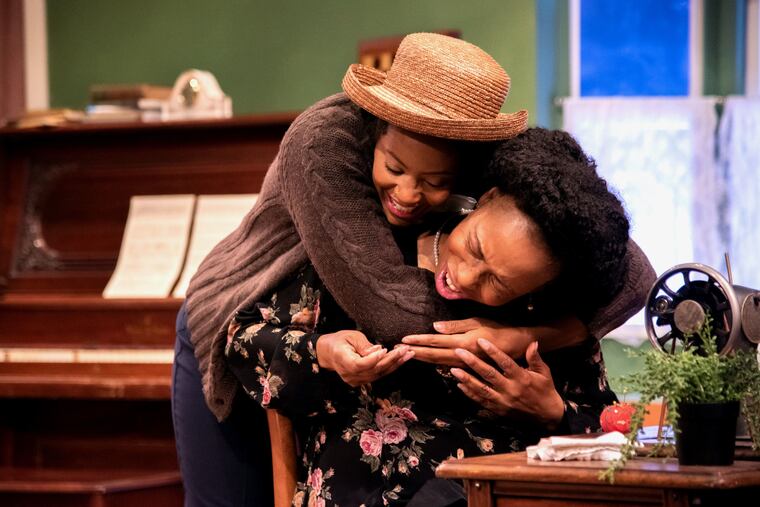This play broke racial barriers. Now it’s back on stage in Philly
Our reviewer says: Go see it, for at least two great reasons.

There are at least two reasons — good ones — to see Rachel at the Quintessence Theatre Group through Feb. 23.
The first is Angelina Weld Grimké's play itself, first performed in 1916. Grimké was of mixed race, female, gay, and a forerunner of the Harlem Renaissance. She wrote Rachel as part of a national outcry against the insanely racist D.W. Griffith film The Birth of a Nation. Rachel is a historical treasure, and applause is due Quintessence for running it in this, the group’s 10th year.
The second reason is to watch a talented, passionate ensemble raise Rachel above its shortcomings as a play.
Rachel is best when we’re watching the Loving family brought to life. Yes, that last name’s loaded. (But then loving is what’s in question. Can we love in such a world? What if the answer is No, we can’t?)
Splendid, tireless Jessica Johnson portrays Rachel Loving’s passage from dreamy youth to disillusioned adulthood. Johnson wrings unsuspected nuances from this demanding role. A second shout-out goes to Zuhairah McGill as Mary Loving, a long-suffering mother who gazes at her children and murmurs, “I can’t save you.”
This fine cast makes us love the Lovings. At opening night Thursday, the audience chuckled as the kids needled one another, the mom pleaded for order, and everyone gave and received good news and bad.
The Lovings have moved from the South to an unnamed northern city, but the children — Rachel and Thomas (played with sparkle and pathos by Travoye Joyner) — don’t know the whole story. Soon Mrs. Loving, who supports the family as a seamstress, must tell them. They know their father and a brother died when they were very young, but they don’t know both were lynched.
That’s the first depth charge. There will be more, when, despite success at school — Thomas gets a certificate in electrical engineering — they can’t find work. They take in Jimmy Mason, whose parents die of influenza. A brilliant stroke here is to cast an adult, the kinetic Nathan Alford-Tate, as Jimmy. He becomes Rachel’s child.
But as prejudice wears Jimmy down and his light begins to dim, Rachel’s hopes begin to gutter out, too. “We are all blighted,” she concludes. “We are all accursed — all of us — everywhere, we whose skins are dark — our lives blasted by the white man’s prejudice."
Grimké’s master stroke is to use motherhood to probe the tragedy of racial conflict. In truth, though, Rachel is important but imperfect. It’s too long. It’s also too reliant on melodrama. (As of 2020, you have to ask: Might Rachel’s destiny be not madness but rather stark bitterness?) Talented director Alexandra Espinoza makes lots of judicious trims to make the play more muscular, and her direction instills the performance with energy and drive.
It’s still too long, crying out for further sculpting and toughening. Just one example: At the end of Act 2, we see Rachel’s unforgettable, perverse reception of a gift of roses. Then in Act 3 she retells the whole thing to family and friends.
But Quintessence shows us why we need to know Rachel. In its clear-eyed questions and still-shocking answers, it anticipates American drama of the next century — down to our own era.
Theater Review
Rachel
Through Feb. 23 at Quintessence Theatre Group, Sedgwick Theater, 7137 Germantown Ave.
Tickets: $20-$59. (Philly Theatre Week tickets available through Feb. 16 at $15.)
Information: 215-987-4450, quintessencetheatre.org.